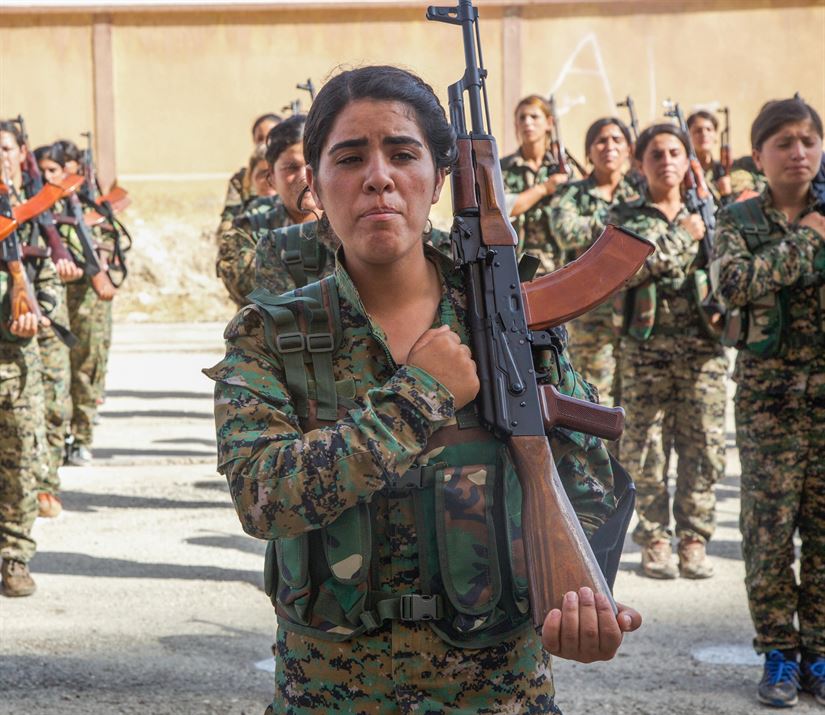US Must Bolster Its Presence In MidEast As ISIS Falls
Posted on

Syrian Democratic Forces trainees
As ISIS goes down to military defeat, the United States requires a longer-range plan and an enduring force presence to deny Iran total victory in Syria.
Otherwise, the United States risks losing influence as a new Middle Eastern order is being forged.
The last ISIS-occupied towns in Syria and Iraq fell recently, but not to the U.S.-led coalition. While the United States and its allied Syrian Democratic Forces (SDF) of Kurds and Sunni Arabs were liberating Raqqa, the Syrian regime and its backers launched an ambitious cross-country offensive into the neighboring resource-rich province of Deir ez Zour.
Assad’s ground troops included Iranian, Hezbollah, Iraqi and other Shia forces – reportedly under the direct command of Gen. Qassem Soleimani, commander of the IRGC’s Qods Force – backed by Russian air power. Even before Raqqa officially fell, Soleimani and the SDF were racing each other through Deir ez Zour province, that last ISIS holdout and the final missing piece of Iran’s envisioned land bridge connecting Tehran directly to Hezbollah in Lebanon.

Eric Edelman
Unless stopped, the multinational force marching under Tehran’s orders will determine the region’s future. Time is essential. Were it to roll back the SDF’s recent gains – as the Iranian Supreme Leader’s foreign policy adviser stated – and cement its hold over the strategically and economically vital province, Iran would become the arbiter of postwar Syria and its hegemony in the strategic crossroads of the Middle East. This would effectively expand Iran’s borders all the way to key U.S. allies, especially Jordan and Israel, increasing the risk of an Iranian-Israeli war. U.S. credibility in the region and beyond would be undermined.
It would also put other regional countries on notice that Iran is the major power they must appease or confront, by themselves, to maintain their security. The result could be a pattern of instability that is increasingly evident across the region, including in Yemen, where Iranian-supported Houthis recently launched their most brazen missile attack on Saudi Arabia to date.
Yet American policymakers have not articulated coherent objectives in Syria beyond destroying ISIS. And even though President Trump announced in his October 13 address a new policy of countering Iran’s “destabilizing activity and support for terrorist proxies in the region,” his administration is sending mixed signals. Defense Secretary James Mattis says the military will retain a role in Syria, at the same time the president reportedly told Turkey the United States will no longer arm its Syrian Kurdish partners.

Charles Wald
Last week the Iran Task Force at JINSA’s Gemunder Center for Defense and Strategy, which we lead, warned of the urgent need and proposed recommendations for restoring crucial U.S. leverage against further Iranian aggression.
American policymakers must emphasize they will maintain a military presence in Syria to protect U.S.-backed groups and the territory they have clawed back from ISIS. They should also make clear U.S. forces and our Syrian surrogates will vigorously defend themselves if attacked by Syrian regime forces or Iranian proxies.
The United States should also continue developing and expanding these surrogates’ capabilities. This will preserve vital leverage for determining Syria’s political future, and will interpose unmistakable obstacles to Iran’s land bridge. American forces likely would need to bolster their own presence behind the front lines and their train, advise, assist and equip efforts in Syria.
In tandem, the United States should cooperate deeply with Israel, Jordan, Egypt, Saudi Arabia and the United Arab Emirates to interdict Iranian efforts to transfer weapons to Syria and its proxies, as well as build military bases and missile production facilities in Syria. This allied effort should involve integrating missile defense capabilities to counter the rising missile threat from Syria.
These recommendations are designed to rebuild leverage against Iran where the strategic stakes are the highest and where it is most vulnerable to counter-pressure: Syria. Alone, they won’t be sufficient to reverse completely Iran’s ascendance. Without them, however, the defeat of ISIS will prove the triumph of Iran.
Michael Makovsky, CEO of JINSA (Jewish Institute for National Security of America), worked in the Office of Secretary of Defense for the Coalition Provisional Authority, the postwar Allied entity that governed Iraq. Eric Edelman served as Undersecretary of Defense for Policy during President George H.W. Bush’s second term. Charles Wald is former deputy commander of European Command. They co-chair JINSA’s Gemunder Center Iran Task Force.
Subscribe to our newsletter
Promotions, new products and sales. Directly to your inbox.
